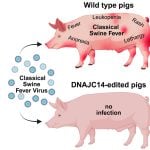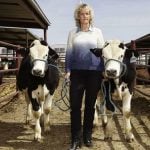Glacier FarmMedia – The biggest win for Canadian producers arising from the Conservative party leadership race may come from one of the contest’s losers.
Erin O’Toole won the leadership bid, beating out his chief rival, Peter MacKay. During the campaign, the two offered nearly identical and fairly mundane platforms for the agricultural sector.
Why it matters: Leslyn Lewis’s focus on agriculture policy is noteworthy as it comes from an urban-based politician.
But the unanticipated success of Dr. Leslyn Lewis should be considered a win for farmers. By performing significantly better than expected, particularly from rural areas and the West, she raised her stock within the Conservative party.
Read Also

Canada to have increased presence at Agritechnica 2025
Interest in diversifying trade markets is taking more Canadian manufacturers to Agritechnica 2025, the world’s largest machinery show.
O’Toole and his inner circle would be ill-advised to ignore the success of Lewis, and will likely want to tap into some of the policies that contributed to her success.
It was Lewis who offered the most detailed agricultural platform, even if O’Toole and MacKay said all the right things to producers during their bid for the leadership.
While much of Lewis’s success was on the back of her social conservatism and pro-life views, the increase of her overall stature within the party could draw attention to agricultural policies she championed.
For example, Lewis was the only candidate to definitively say restoring the AgriStability program to previous levels of covering 85 per cent of losses would be a priority.
She was the only candidate to mention the program in her response to a survey from the Western Canadian Wheat Growers Association, despite it being a long-time and frequent annoyance to producer groups from coast to coast.
The Toronto-based lawyer who has never served in parliament may not have jumped out at first glance as being the most likely Conservative leadership hopeful to best support agriculture, but her platform showed she understands the issues important to producers.
That’s not to say O’Toole or MacKay didn’t understand the issues.
Each said removing the carbon tax would be their main priority for the sector, while also proposing to pursue international markets and removing regulatory burdens as part of their platforms.
Those similarities among the platforms are a win for producers too because each of the candidates showed an awareness of the issues and generally agree on what they believe is best for the sector.
By avoiding ideological arguments on certain issues impacting agriculture, the party will dodge internal squabbles that could potentially derail their long-term prospects of getting elected.
It is now clear that when it comes to agriculture, Conservative party members are largely united.
That wasn’t exactly the case during the last Conservative party leadership contest, when the future of supply management caused significant animosity within party ranks. That fissure widened into a minor identity crisis within the party, eventually prompting an ugly exit from supply management’s chief enemy in the party, Maxime Bernier.
This time around, there is more consensus among members. Supply management was supported by the leadership contenders.
Every Conservative who voted in the leadership supported a candidate committed to protecting Canada’s food supply from illegal blockades and ensuring unfair competition is eliminated.
I’m still not sure to what degree any politician can reasonably achieve either of these goals, but at least the sentiment is consistent.
Each vote cast was also one in favour of improving broadband internet capabilities in rural areas, and making intergenerational farm transfers easier. (Side note: the Liberals have committed to doing the same).
Surely, any of the candidates would have been a positive for agriculture. The Conservative party is reputed, deservedly or not, to strongly accommodate farmers, who overwhelmingly vote Conservative in general elections, but Lewis’s rise in the party could prove to be the biggest win for producers.













